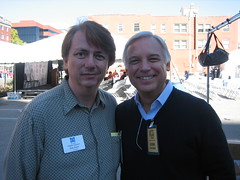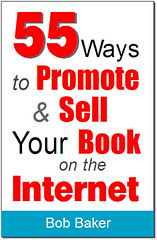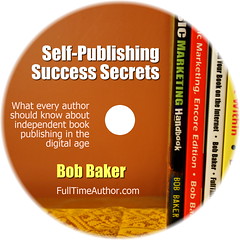Bob Baker's Book Promotion Blog
Hard Lessons of Traditional Publishing
I've written about using your independently published book to Attract a Traditional Publisher. And it's true: Doing it yourself at first is an ideal way to get there.
Why go through rejection and delays, when you can get an early version of your book into the marketplace now and start building a fan base? Once you have a track record and a success story to tell, you'll have more value to bring to an agent or publisher.
But there's another side to this story: Self-publishers who were lured by the clout of a traditional publishing deal ... and ended up regretting it.
Angela Hoy shares her tainted experiences with a major New York publisher on her WritersWeekly site. She doesn't specify the title, but it's pretty obvious she's referring to How to Publish and Promote Online, the book she co-authored with M. J. Rose. She relates the frustrations she encountered with delays, mistakes and missed opportunities -- all the result of not being in control of her own work.
Read her entire story here. It's an eye-opening account.
-Bob
P.S. Want to jump-start your career as an independent author? Check out the brand-new Self-Publishing Success Secrets 101.
 Get more tips and inspiration when you subscribe to my free "Full-Time Author" ezine. I'll even send you a free download of my Self-Publishing Confidential report. Learn more about the free subscription here.
Get more tips and inspiration when you subscribe to my free "Full-Time Author" ezine. I'll even send you a free download of my Self-Publishing Confidential report. Learn more about the free subscription here.Your email address will not be shared. Unsubscribe at any time.
Connect with Bob on Google+
Self-Publishing Success Secrets 101
If you read this blog, you obviously have a book inside you. You have a longing to express yourself through a book -- and, hopefully, do so by publishing it yourself. As you may know, I've been actively involved with writing and publishing for many years. And over the past four years in particular, I've made a good living exclusively from the sales of my self-published books, reports, audio programs, and more.
As you may know, I've been actively involved with writing and publishing for many years. And over the past four years in particular, I've made a good living exclusively from the sales of my self-published books, reports, audio programs, and more.
It's how I plan to spend the rest of my days, as I truly feel I've found my right livelihood.
I know first-hand the sense of personal satisfaction that comes from putting out your own book. I also understand the deep sense of purpose and meaning a book can give you when it touches people's lives in ways you never imagined.
I've benefited greatly from my pursuit of do-it-yourself book publishing, and now I'm on a mission to empower others to enjoy the same thrills as I have.
I've done that for the past three years serving as president of the St. Louis Publishers Association. I've been doing it through this blog and my FullTimeAuthor.com site. And now I'm taking things a step further with the release today of my new audio/ebook package called "Self-Publishing Success Secrets 101."
It's an ideal resource for first-time authors and other self-publishers wanting to kick-start their book publishing efforts.
What's different about this guide?
A lot of the popular publishing manuals out there are hefty and cover a lot of ground. But the sheer volume of technicalities causes confusion and information overload for many aspiring authors.
That's why I created this guide. To give you a quick crash course on the most important things you need to know to become a successful self-published author -- and to share some of the untraditional methods that got me where I am today.
Anyway, take a closer look at
www.bob-baker.com/self-publish-book/ebook-audio.html
I'd love to hear what you think.
-Bob
P.S. Do you prefer to read, or listen to books on your iPod or CD? I love doing both. That's why "Self-Publishing Success Secrets 101" comes as a 25-page ebook AND 50 minutes of MP3 audio files. Print it and read it, or burn it and listen on the go. You'll have multiple ways to soak up these self-publishing tips and advice.
 Get more tips and inspiration when you subscribe to my free "Full-Time Author" ezine. I'll even send you a free download of my Self-Publishing Confidential report. Learn more about the free subscription here.
Get more tips and inspiration when you subscribe to my free "Full-Time Author" ezine. I'll even send you a free download of my Self-Publishing Confidential report. Learn more about the free subscription here.Your email address will not be shared. Unsubscribe at any time.
Connect with Bob on Google+
Attract Fans, Not Visitors
There's nothing more powerful than a direct connection with readers (whom I prefer to call friends and fans). And one of the most potent ways to make that connection is to inspire someone to give you their name and email address (and snail mail too, if you can get it).
Having your own author web site is fine, but you must do more than just sit back and hope that people visit. You need to be more proactive and convert casual visitors into connected fans.
Brian Clark wrote about the importance of subscribers on his excellent Copyblogger site. He may have been writing specifically about blog subscribers, but the principle applies to your email subscribers and anyone who signs up for your mailing list online or off.
A subscriber has made a commitment to you that a mere site visitor hasn't. Something magical happens when someone raises their hand and says "please communicate with me on a regular basis." This small commitment is the heart of permission marketing, a very powerful concept that seems to be getting lost in all the Web 2.0 hoopla.
A subscription not only increases the frequency and regularity of contacts with a prospect, it also changes the frame through which that prospect will view your eventual offer. The prospect's world view may now be such that a purchase is more likely thanks to the subscription relationship.
Subscribers and participants in your blog comments can be your most loyal allies. They'll tell their friends about you and rush to your defense in times of trouble.
Yes, a subscriber will be far more committed to you than a random, drive-by web visitor. So build that mailing list and use it often to develop your fan base!
And ... don't get stuck because you think starting a mailing list will be complicated and time-consuming. It's not. It's something you need to do to survive and thrive as an independent author.
Just do it!
-Bob
 Get more tips and inspiration when you subscribe to my free "Full-Time Author" ezine. I'll even send you a free download of my Self-Publishing Confidential report. Learn more about the free subscription here.
Get more tips and inspiration when you subscribe to my free "Full-Time Author" ezine. I'll even send you a free download of my Self-Publishing Confidential report. Learn more about the free subscription here.Your email address will not be shared. Unsubscribe at any time.
Connect with Bob on Google+
Jack Canfield & the Power of Action
One of the big things that stops people from publishing their own book is what I call the Perfection Curse. Aspiring authors feel that everything must be squeaky clean and flawless before a book can materialize. And the burden of juggling all the details keeps them from staying with it long enough to see their book become a reality.
Here's some advice that goes against the grain of what you'll read elsewhere: Of course, strive for the best book you can create, but don't let the Perfection Curse keep you from breathing live into your book idea. Just get it out there -- then fine tune it later.

Here's an excerpt from an article by Jack Canfield, author of The Success Principles and co-compiler of the bestselling Chicken Soup for the Soul books. (You might say Jack knows a few things about selling tons of books.)
As you begin to take action toward the fulfillment of your goals and dreams, you must realize that not every action will be perfect. Not every action will produce the desired result. Not every action will work.
Making mistakes, getting it almost right, and experimenting to see what happens are all part of the process of eventually getting it right.
Ready, Fire, Aim!
Don't be afraid to just jump in and get started moving toward your goals. As long as you pay attention to the feedback you receive, you will make progress. Just getting into the game and firing allows you to correct and refine your aim.
I believe this trait is one of the biggest factors that lead to my full-time author status. If I hadn't started dabbling in publishing and selling information in the early 1990s, if I had waited till I "had it just right," if I had been paranoid about my early attempts at packaging my reports and manuals ... I would probably still be only thinking about "some day" publishing my own book.
But I took action. I got something tangible (albeit low-budget and primitive) out into the world. I got feedback from real, live human beings. And I made a little bit of money right out of the starting gate, which inspired me to improve the material and the packaging, reach more people, and generate more revenue still.
This approach is especially effective using today's digital printing technology. Put your first book together as best you can, then print only 50 copies. Make notes on how to improve the book as you get feedback from readers. If things go well, print more as needed. Then, at some point, update the content and, if needed, upgrade the look of the cover. Then print 100 or more digital copies.
Continue this process until your book gets as close to perfect as you can make it. If sales are brisk, then -- and only then -- should you do a larger offset print run.
Consider Jack's and my advice: Action is a powerful thing. Take it!
-Bob
 Get more tips and inspiration when you subscribe to my free "Full-Time Author" ezine. I'll even send you a free download of my Self-Publishing Confidential report. Learn more about the free subscription here.
Get more tips and inspiration when you subscribe to my free "Full-Time Author" ezine. I'll even send you a free download of my Self-Publishing Confidential report. Learn more about the free subscription here.Your email address will not be shared. Unsubscribe at any time.
Connect with Bob on Google+
No More Codependent Link Love!
You have a great author web site. Now you want lots of readers and book buyers to visit. "What do I do?" you ask. "I know: Start a link swap campaign!"
Not so fast!

It seems every other day I get an email that states something like, "Dear webmaster, I just visited your web site and feel we would both benefit from cross-promoting each other. Please add a link to my site at BoringBookWebSite.com and I'll return the favor."
Not only is this type of marketing impersonal (these form letters are all too obvious), but it's massively ineffective. Link swapping is history. It's so 2002.
There's a better way.
I stopped publishing a links page several years ago. But that doesn't mean I ever stopped linking to outside web sites. I do it all the time through this blog, my music marketing ezine and Artist Empowerment Radio podcast pages.
I never send senseless emails asking people to link to my site. What I do is write about topics of interest to my audience. In the course of doing so, I frequently reference news stories and blog posts I come across, new services that look promising, and other online resources of note.
Then I shoot an email to the site owner or person I wrote about letting them know that I mentioned them. I ask for nothing in return. But a funny thing happens ...
More often than not, the person who runs the site I plugged will post something about the exposure they got from me -- with a link to my web site!
Notice what happened here. A link swap did indeed take place. But there were no mindless emails begging for link love. No "I'll link to yours if you link to mine" groveling. Instead, what took place was a natural conversation, an organic cross-reference to useful information.
And that's the best way to swap links in 2007. Write about and link to online destinations that interest you and your readers. Send a short, friendly note to the blogger, podcaster or site owner you mentioned. Then let it go.
Keep doing that over and over. Give out links without asking for anything in return ... and it will come back to you. Or, to paraphrase The Beatles ...
"... in the end, the link love you take is equal to the link love you make."
-Bob
P.S. As I was finishing up this post, the classic rock radio station I had on (which I rarely listen to) played this exact Beatles track from Abbey Road -- after I had written the line above. Weird, huh?
 Get more tips and inspiration when you subscribe to my free "Full-Time Author" ezine. I'll even send you a free download of my Self-Publishing Confidential report. Learn more about the free subscription here.
Get more tips and inspiration when you subscribe to my free "Full-Time Author" ezine. I'll even send you a free download of my Self-Publishing Confidential report. Learn more about the free subscription here.Your email address will not be shared. Unsubscribe at any time.
Connect with Bob on Google+




